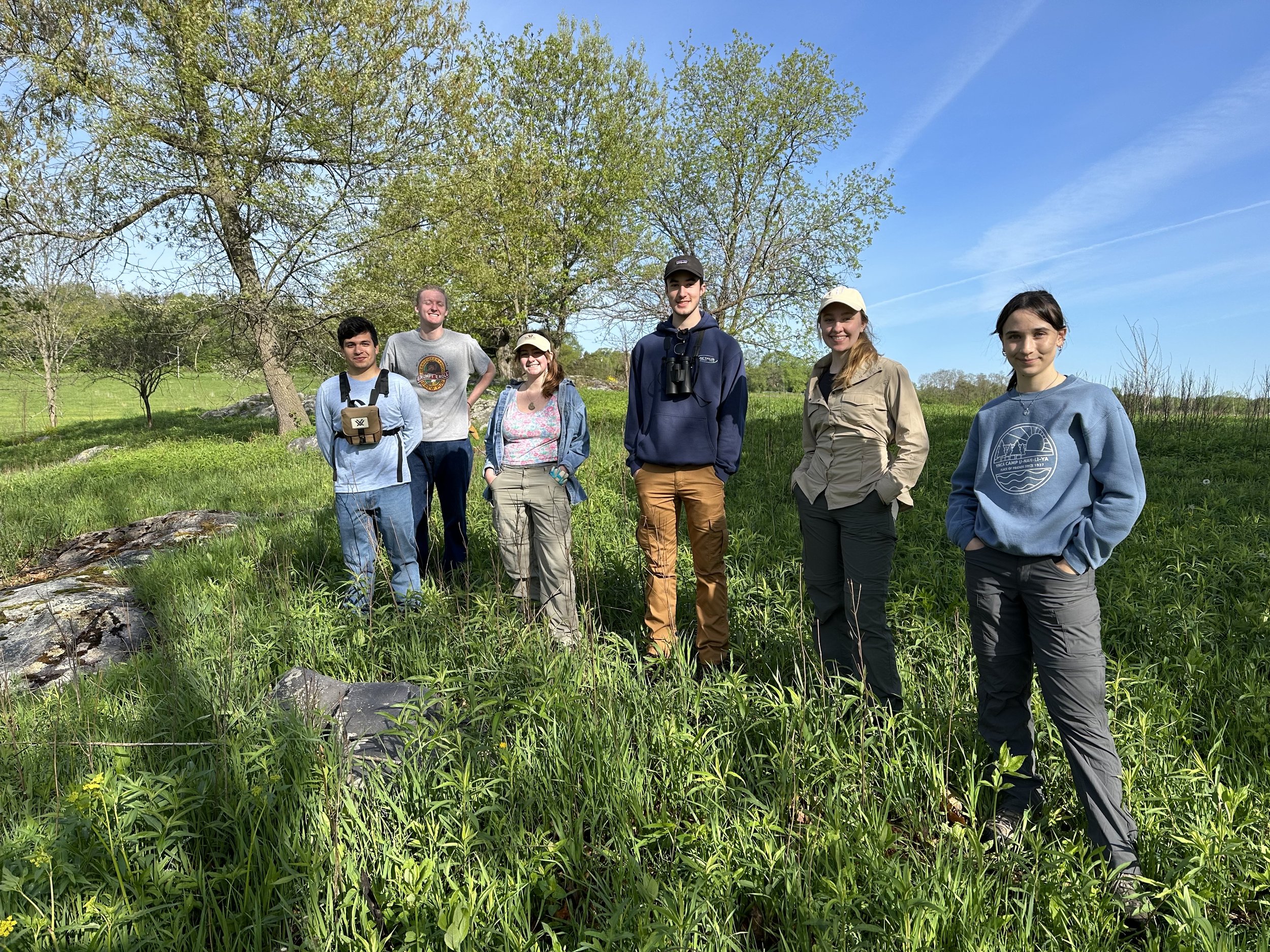The latest Madison Audubon newsletter featured some wonderful news and newcomers. Our two teams of interns have started their summer work at our sanctuaries. At Goose Pond: Emma Thogmartin, Katie Porubcan, Maurisa (Mo) Perez, Paul Millan, Krister Martensson and at Faville Grove: Josh Brazee, Olivia Granec, Samuel Guerra, Lexi Kohn, Grace Lezotte, and Mikael Rohou. FABULOUS FOR US AND THEM.
2023 Faville Grove Sanctuary intern team (l to r): Sam Guerra, Josh Brazee, Lexi Kohn, Mikael Rouhou, Olivia Granec, and Grace Lezotte. Photo by David Musolf
2023 Prairie Partner intern team (l to r): Paul Millan, Emma Thogmartin, Katie Porubcan, Krister Martensson, Mo Perez. This crew will work at Goose Pond Sanctuary one day per week. Photo by Emma Raasch
Our sanctuaries are labor intensive. We cannot maintain and improve them without our interns. The summer crews tackle tasks, in particular the battles against invasives, that we cannot address adequately or seasonably (btw, English has a bit of a hole-- try to find exactly the right adverb for timely). Invasive control takes lots of folks in good physical shape willing and able to work during the summer. Those days are past for this aging volunteer.
A group of summer interns at Faville Grove Sanctuary (2007) work to remove invasive species from the edge of a natural area. The crews work full time the entire summer on restoring habitats to their native glory. Photo by Brenna Marsicek
As hard as the interns work, Madison Audubon works as hard to provide them a rewarding experience. First, we try to pay a fair wage. Interns need to support themselves over the summer and save something for their return to school or their full time entry into our daunting economy. One of the last votes I took on the Madison Audubon Board of Directors was to boost the compensation for all our interns; I hope and trust our Board has continued to do so.
We provide a safe and respectful working environment. The sanctuaries and the work they require offer lots of beauty and energy but also provide plenty of obvious and hidden dangers. Hand tools, power tools, pesticides, machinery, and unfriendly critters (ticks, thinking of you) all demand consistent safety instruction and the interns' attention. Staff are careful to supervise and instruct interns respectfully, which includes guidelines for the crew members to respect and enjoy one another.
A key goal and benefit for the interns is to enable them to learn as much as they can about the natural worlds in which they immerse themselves. The topics can be species or management technique specific or focus on broader ecological concerns but our aim is to have the interns learn a lot about a lot. Another btw: we learn from the interns too. To get these jobs, the interns present solid educational achievements and sometimes impressive field experience. Our staff will always have learned from our interns by season's end.
Prairie Partner interns (2016) hold American Kestrel chicks after the chicks were banded at Goose Pond Sanctuary. One of the perks of the internship is having a front-row seat to great bird research! Photo by Arlene Koziol
Jobs is a key word too. The internships are jobs and often among the first few our young folks have had. You learn a lot from your first jobs. Lots of our interns love the work and have started brilliant conservation careers. That's great. But some of them decide: hey, wait a minute, this job or life is not for me. Let's figure out another path. That is equally great. We hope that these young adults will carry some of the conservation ethics they learn in their internships throughout their lives, regardless of their careers. And sometimes the best lesson from a first or second job is to recognize a certain career is not for you or you encounter certain unpleasant situations (those can be personnel, task, or skill related) that you learn from.
Which reminds me of a learning experience from my first job at age 16 in the summer of '70 at Little Rock Road Machinery in Arkansas. I was a stock boy at the regional Caterpillar dealership. Part of that was pretty cool because this place sold and repaired the big boys, massive road graders and bulldozers. The princes of LRRM were the diesel mechanics. They earned $25 per hour with full benefits. They all took an hour lunch at the same time in the air conditioned room where they discussed gardening and fishing. And no one bothered them.
One noontime Mr. Staley, the general manager, was dealing with an extremely irate customer in the showroom. Staley summoned me and told me to tell John, one of the mechanics ensconced in the lunchroom, to join him with the customer immediately. I entered the room, which went silent with all eyes on me, and told John, "John, Mr. Staley needs to see you right away." To which John replied, pretty loudly, "Tell Mr. Staley to f*** himself."
I returned to Mr. Staley and said, "John will be with you right away." And then fled to the back of the warehouse at the back of the property for the next two hours.
I don't think our interns will ever have the benefit of that type of learning experience. It does illustrate, though, you never know what you might learn from a summer internship or job. When I returned from the warehouse, the brouhaha had ended. Neither Mr. Staley nor John said anything about it to me and I ended up with a good summer experience. The lesson I learned that day is that sometimes a full retreat is the best course of action.
Topf Wells, Madison Audubon advocacy committee






